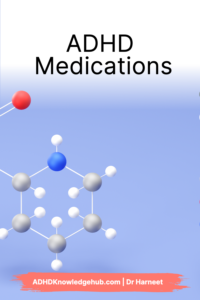ADHD Medications
Introduction
Attention Deficit Hyperactivity Disorder (ADHD) is a common neurological condition characterized by persistent patterns of inattention, hyperactivity, and impulsivity. As a psychiatrist practising in the UK, I have seen first-hand how effective medication can be as part of a comprehensive treatment plan for ADHD. This article explores the benefits and risks associated with ADHD medications and their success rates compared to other conditions and provides practical suggestions based on clinical experience and available data.
Understanding ADHD Medications
In the UK, the primary medications prescribed for ADHD are stimulants like methylphenidate and amphetamines, as well as non-stimulants such as atomoxetine and guanfacine. These medications enhance brain activity, particularly in areas that control attention, impulsivity, and activity levels.
Benefits of ADHD Medications
Patients on these medications often experience significant improvements in their ability to focus, maintain attention, and live less impulsively. This can lead to better performance in school, work, and improved interpersonal relationships.
Risks and Side Effects
Despite their benefits, ADHD medications come with potential side effects. Common ones include sleep disturbances, decreased appetite, and mood swings. Long-term use raises concerns about cardiovascular health and potential dependency.
Success Rate of ADHD Medications
Statistically, ADHD medications show a high success rate, often cited as improving symptoms in about 70-80% of cases. This is higher compared to many other medications for different conditions, which underscores their effectiveness in managing the disorder.
Personal Experience with ADHD Medications
In my practice, I’ve observed numerous cases where patients have turned their lives around with the help of these medications. Success stories range from improved academic achievements to better overall mental health.
Challenges in ADHD Medication Management
Managing medication requires careful consideration of dosages, timing, and regular monitoring to avoid side effects and ensure optimal outcomes.
Alternative Therapies
While medications are effective, they are best used in conjunction with other treatments such as behavioural therapy, counselling, and lifestyle changes. These holistic approaches can reduce the need for higher medication doses and mitigate side effects.
Choosing the Right Medication
Deciding on the right medication involves understanding individual needs, medical history, and specific symptoms. It’s a decision that should be made collaboratively with a healthcare professional.
The Role of a Psychiatrist in ADHD Management
As a psychiatrist, I provide not just prescriptions but also comprehensive care that includes regular follow-ups, adjustments in treatment plans, and emotional support.
Advice for Patients and Families
It’s crucial for patients and their families to be well-informed about the medication regimen, adhere strictly to prescribed doses, and maintain a routine that supports treatment goals.
Navigating the UK Healthcare System
Accessing ADHD medication involves navigating the NHS and understanding the pathways for diagnosis and treatment, which can sometimes be complex and require persistence.
Recent Advances in ADHD Treatment
Recent years have seen the development of new ADHD medications and therapeutic approaches that promise better outcomes with fewer side effects.
Conclusion
ADHD medication, when used appropriately, offers a significant improvement in quality of life for many patients. It is important, however, to approach treatment with a balanced perspective on the benefits and risks, informed by up-to-date clinical evidence and guided by experienced medical professionals.
FAQs
1. What is the first step to obtaining ADHD medication in the UK?
The first step is to obtain a formal diagnosis from a healthcare professional, typically a psychiatrist. After evaluation, if ADHD is diagnosed, a treatment plan, including medication, can be discussed and initiated.
2. How long does it typically take to see improvements with ADHD medication?
Most patients begin to notice improvements in symptoms within the first few weeks of starting medication. However, it may take several adjustments in dosage and type of medication to achieve optimal results.
3. Can ADHD medication be taken alongside other prescriptions?
Yes, ADHD medication can often be taken with other prescriptions, but it’s crucial to inform your doctor about all medications you’re currently taking. This will help avoid any potential drug interactions and ensure safe treatment.
4. What should I do if I experience severe side effects?
If you experience severe side effects, contact your healthcare provider immediately. It may be necessary to adjust the dosage or switch medications. Never stop or alter medication without professional guidance.
5. Is it possible to stop taking ADHD medication if symptoms improve significantly?
Stopping medication may be considered if symptoms have significantly improved, but this should always be done under the supervision of a healthcare professional. Gradual tapering off might be required to monitor any changes in symptoms and ensure stability.
These FAQs aim to provide clear, actionable advice for individuals dealing with ADHD and considering medication as a part of their treatment strategy in the UK.

*We may earn a commission for purchases made using our links. Please see our disclosure to learn more.




